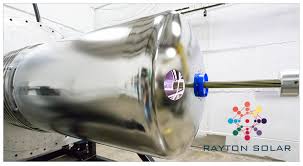US based, Rayton Solar is planning to introduce cheaper solar energy products and solutions.
Rayton Solar’s patented technology will use a particle accelerator in the form of a laser beam to conduct ion implantation.
Eventually, this accelerator will blast H+ protons directly into a silicon ingot, attach the silicon to a substrate, exfoliate directly off the ingot with zero silicon waste and conduct screen-print wiring, finalizing the solar cells.
Rayton is using 1/50 to 1/100 less silicon than the industry that is 4 microns of silicon with zero waste.
In addition, Rayton is using Float Zone Silicon, higher grade silicon with 25 percent more efficiency.
The team consists of clean tech entrepreneurs scientists and engineers. Besides, Rayton Solar is headed by Andrew Yakub, solar industry entrepreneur, trained physicist, and particle accelerator expert.
They have developed working solar cells utilizing their patented technology. They are currently raising a round of financing to become UL certified which allows them to sell their product in the US.
In US, the national average cost per watt is somewhere between $6 dollars and $3 dollars per watt. Generally, the cost per watt of a solar energy system decreases due to economies of scale when more solar panels in a system.
With affordable solar solutions in USA, a small 4 solar panel system that has a total power output of 1,120 watts (1.12kW) costs $7.20 per watt while a larger 24 panel system that has a total output of 6,720 watts (6.72kW) costs $4.75 dollars per watt.
A recent report from Deutsche Bank shows that solar has already achieved price parity with fossil fuel-based grid power in 10 U.S. states.
Deutsche Bank says that solar electricity is on track to be as cheap as or cheaper than average electricity-bill prices in all but three states by 2016.
According to the National Renewable Energy Laboratory (NREL), the cost of putting solar panels on a typical American house has fallen by some 70 percent over the last decade and a half.
Sabeena Wahid
editor@greentechlead.com

